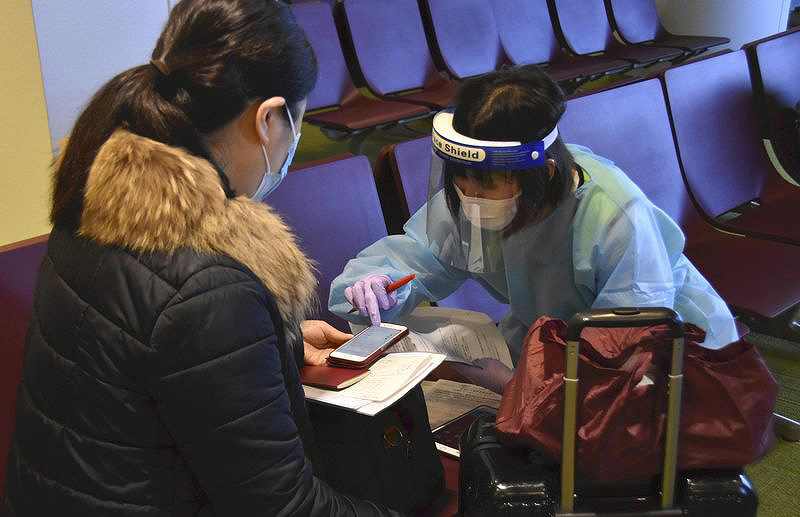
A worker, right, checks if an entrant to Japan has installed a smartphone app as a coronavirus measure at Narita Airport in March.
November 9, 2021
The government has eased restrictions on entry to Japan related to the novel coronavirus pandemic, sharply reducing the quarantine period and allowing in new foreign students and technical intern trainees who have met certain conditions.
As of Monday, the quarantine period has been trimmed to three days in principle, down from the previous 10 or 14 days, primarily for business travelers. Visitors must fulfill certain requirements for the shorter isolation period, including being vaccinated.
Businesses are hopeful this will stimulate economic activity. There are calls for restrictions to be eased further, but careful consideration will likely be necessary to avoid a resurgence in infections.
The government had limited the entry of foreign nationals to people with “special circumstances,” such as foreigners who live in Japan, and had asked them to quarantine at home or accommodations such as hotels for 10 days or 14 days after entering the country.
“It’s convenient and will make my work easier,” a 38-year-old Singaporean man who works for a tech company said on Monday at Narita Airport. “I hope [international] traffic will increase from now on.”
A 46-year-old Filipino man recalled his experience of quarantining for 10 days and said, “It was long, lonely and hard.” He added, “I often come to Japan, so it’s good that the hurdles for entry have been lowered.”
Ken Kobayashi, chairman of Japan Foreign Trade Council, Inc. and Mitsubishi Corp., said in a statement, “This is an important step toward normalizing business traffic to and from overseas while ensuring safety, and I sincerely welcome it.”
Companies are expected to gradually resume overseas business trips. “For important cases, we’re considering resuming business trips to countries where vaccinations have progressed,” a spokesperson for Ajinomoto Co. said.
An official of Japan Airlines Co., which has been suffering from a slump in international flights, welcomed the easing of entry restrictions as a “tailwind” for its business performance.
However, he said, “This doesn’t mean that [people entering the country] can now move around with complete freedom,” and is asking for further measures.
The Japan Business Federation (Keidanren) announced Monday a new proposal for striking a balance between anti-virus measures and the revitalization of social and economic activities. In the proposal, Keidanren welcomed the reduction of the quarantine period to three days as “a major step toward appropriate immigration control,” but reiterated its request in a September proposal to exempt vaccinated people from quarantining after entering Japan.
It also called for simplifying and speeding up immigration procedures.
Top Articles in Society
-

Man Infected with Measles Reportedly Dined at Restaurant in Tokyo Station
-

Man Infected with Measles May Have Come in Contact with Many People in Tokyo, Went to Store, Restaurant Around When Symptoms Emerged
-

Woman with Measles Visited Hospital in Tokyo Multiple Times Before Being Diagnosed with Disease
-

Australian Woman Dies After Mishap on Ski Lift in Nagano Prefecture
-

Foreign Snowboarder in Serious Condition After Hanging in Midair from Chairlift in Nagano Prefecture
JN ACCESS RANKING
-

Japan PM Takaichi’s Cabinet Resigns en Masse
-

Japan Institute to Use Domestic Commercial Optical Lattice Clock to Set Japan Standard Time
-

Israeli Ambassador to Japan Speaks about Japan’s Role in the Reconstruction of Gaza
-

Man Infected with Measles Reportedly Dined at Restaurant in Tokyo Station
-

Videos Plagiarized, Reposted with False Subtitles Claiming ‘Ryukyu Belongs to China’; Anti-China False Information Also Posted in Japan






















